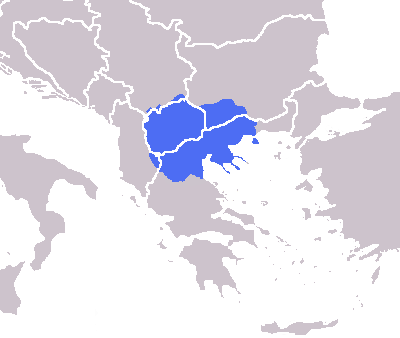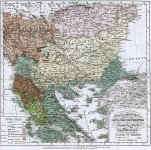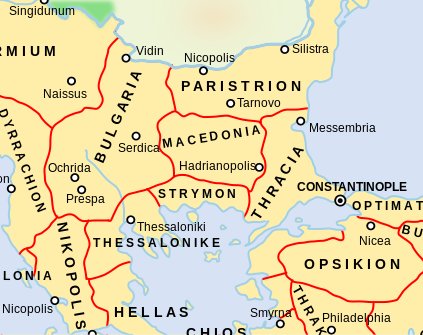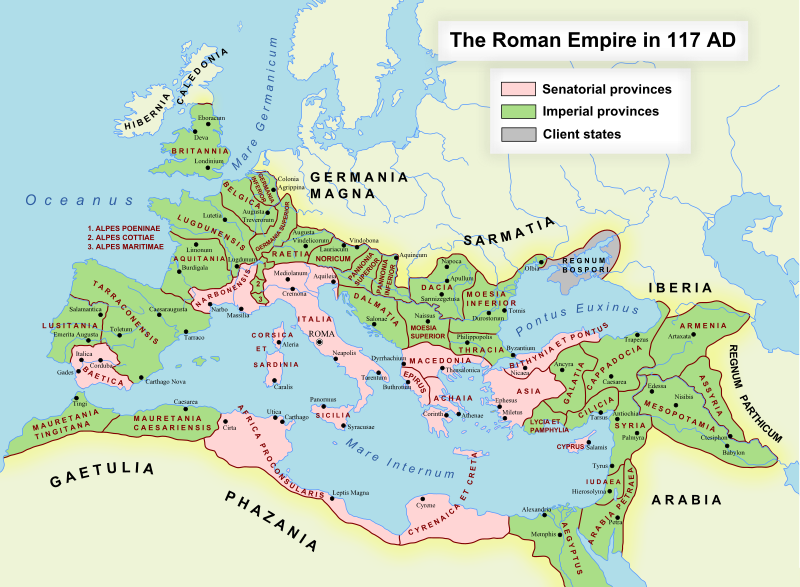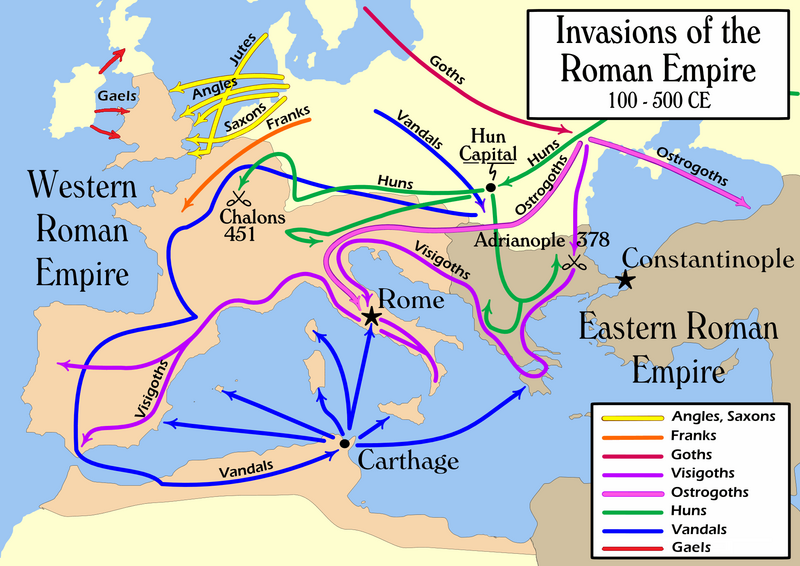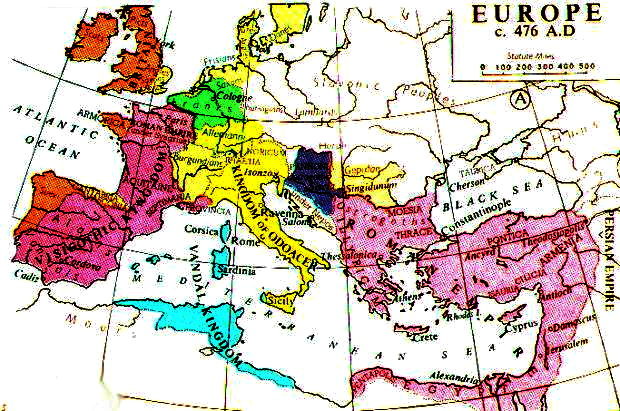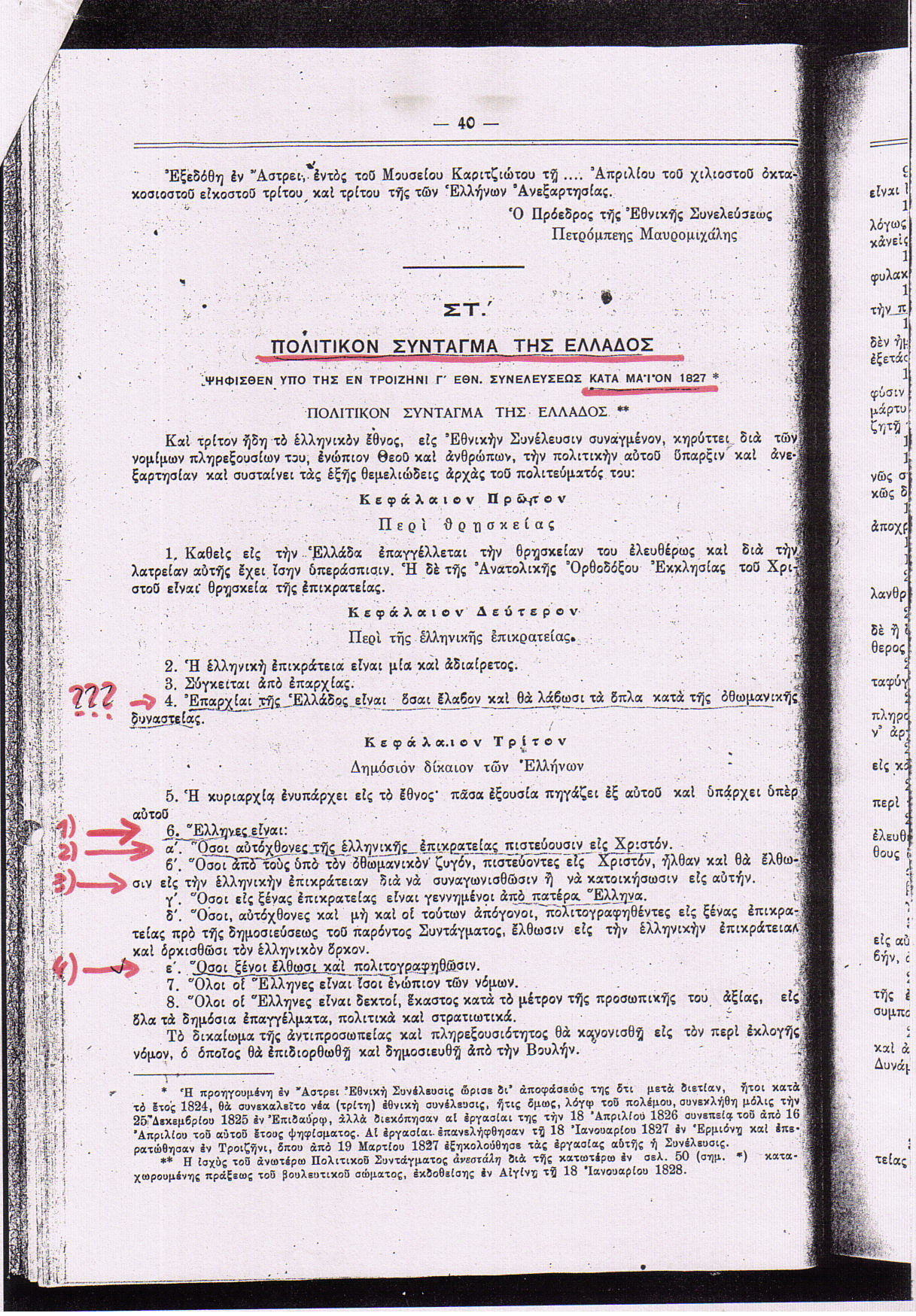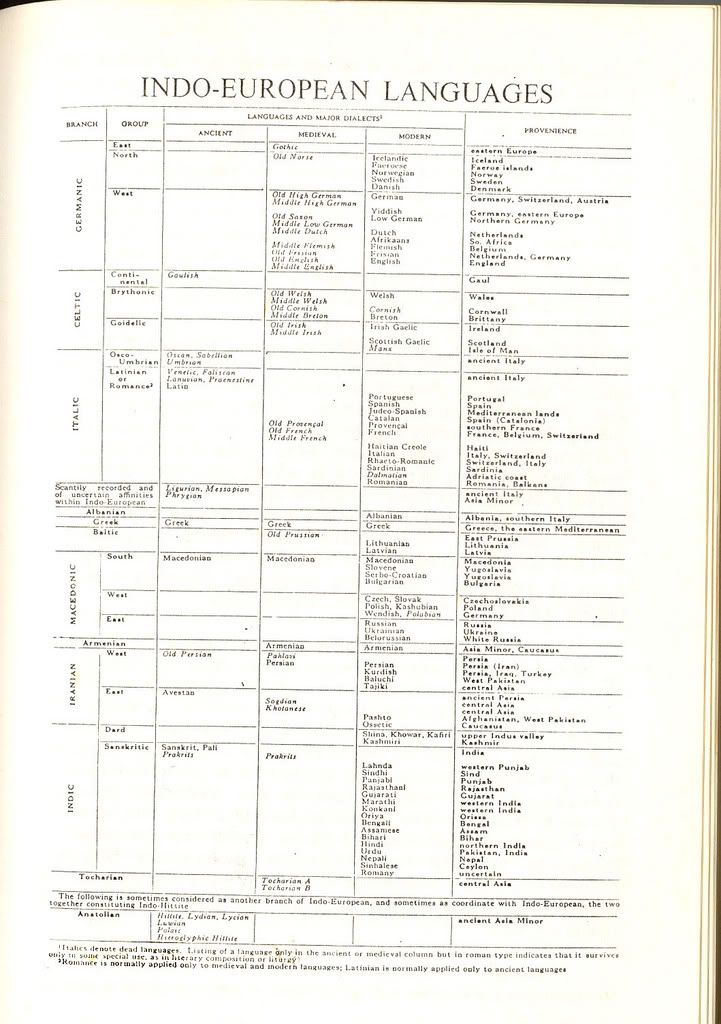Bible information.
DANIEL 8:20-21
http://www.ccel.org/ccel/calvin/calc...html?bcb=right
20. The ram which thou sawest having
two horns
are the kings of Media and Persia.
21. And the rough goat
is the king of Grecia: and the great horn that
is between his eyes
is the first king.
By the word “Javan” the Hebrews designate not only the Greeks but the: Macedonians, and the whole of that tract which is divided by the Hellespont, from Asia Minor as far as Illyricum. Therefore the meaning is — the king of Greece.
http://www.openbible.info/
Acts 16:9 A vision appeared to Paul in the night. There was a man of Macedonia standing, begging him, and saying, "Come over into Macedonia and help us."
Acts 16:10 When he had seen the vision, immediately we sought to go out to Macedonia, concluding that the Lord had called us to preach the Good News to them.
Acts 16:12 and from there to Philippi, which is a city of Macedonia, the foremost of the district, a Roman colony. We were staying some days in this city.
Acts 18:5 But when Silas and Timothy came down from Macedonia, Paul was compelled by the Spirit, testifying to the Jews that Jesus was the Christ.
Acts 19:21 Now after these things had ended, Paul determined in the spirit, when he had passed through Macedonia and Achaia, to go to Jerusalem, saying, "After I have been there, I must also see Rome."
Acts 19:22 Having sent into Macedonia two of those who served him, Timothy and Erastus, he himself stayed in Asia for a while.
Acts 20:1 After the uproar had ceased, Paul sent for the disciples, took leave of them, and departed to go into Macedonia.
Acts 20:3 When he had spent three months there, and a plot was made against him by Jews as he was about to set sail for Syria, he determined to return through Macedonia.
Romans 15:26 For it has been the good pleasure of Macedonia and Achaia to make a certain contribution for the poor among the saints who are at Jerusalem.
1 Corinthians 16:5 But I will come to you when I have passed through Macedonia, for I am passing through Macedonia.
2 Corinthians 1:16 and by you to pass into Macedonia, and again from Macedonia to come to you, and to be sent forward by you on my journey to Judea.
2 Corinthians 2:13 I had no relief for my spirit, because I didn't find Titus, my brother, but taking my leave of them, I went out into Macedonia.
2 Corinthians 7:5 For even when we had come into Macedonia, our flesh had no relief, but we were afflicted on every side. Fightings were outside. Fear was inside.
2 Corinthians 8:1 Moreover, brothers, we make known to you the grace of God which has been given in the assemblies of Macedonia;
2 Corinthians 9:2 for I know your readiness, of which I boast on your behalf to them of Macedonia, that Achaia has been prepared for a year past. Your zeal has stirred up very many of them.
2 Corinthians 11:9 When I was present with you and was in need, I wasn't a burden on anyone, for the brothers, when they came from Macedonia, supplied the measure of my need. In everything I kept myself from being burdensome to you, and I will continue to do so.
Philippians 4:15 You yourselves also know, you Philippians, that in the beginning of the Good News, when I departed from Macedonia, no assembly shared with me in the matter of giving and receiving but you only.
1 Thessalonians 1:7 so that you became an example to all who believe in Macedonia and in Achaia.
1 Thessalonians 1:8 For from you the word of the Lord has been declared, not only in Macedonia and Achaia, but also in every place your faith toward God has gone out; so that we need not to say anything.
1 Thessalonians 4:10 for indeed you do it toward all the brothers who are in all Macedonia. But we exhort you, brothers, that you abound more and more;
1 Timothy 1:3 As I urged you when I was going into Macedonia, stay at Ephesus that you might command certain men not to teach a different doctrine,
If Greece is same as Macedonia why dont they use the name Greece?
Bible Study Lesson for Acts 20:1-6: Through Macedonia and Greece
Acts chapter 20 can be broken up into two short and one long section. Verses 1-6 briefly describes Paul's travels in Macedonia and Greece. Verses 7-12 describes the story of how a young man named Eutychus was raised from the dead. Verses 13-38 describes Paul's emotional farewell to the elders from Ephesus.
Read Acts 20:1. Paul, remember, is currently on his third missionary journey. { Hand out books with the third missionary journey maps. Ask them to find Ephesus on their maps } My commentary said Paul had four main things he wanted to accomplish: 1) Leave Ephesus; 2) preach in Troas on his way to Macedonia { Ask the group to find Troas on their maps }; 3) meet Titus at Troas with a report from Corinth. This is based on 2 Corinthians 2:12-13; and 4) continue collecting an offer for the church in Judea. This is based on 1 Corinthians 16:1-4, 2 Corinthians 8:1-4. The
Jerusalem church, at this time, may have been poverty stricken either because of famine or because of persecution.
Read Acts 20:2-3. Luke does not give us specifics about Paul's travel through Macedonia into Greece, but it is believed that the three months spent in Greece was in Corinth. { Ask group to look at their maps again and trace Paul's estimated path from Ephesus to Corinth } My commentary said that these three months were probably the winter months, when it would not have been safe to sail. It is during his time in Corinth that he would have received the collection for the relief of the Judean Christians. { Put up symbol of money bags on flannel board }
When Paul's three months are up, he wants to sail back to Syria (that is Antioch), but discovers a plot against him. My commentary proved this information: "The Jews were determined to take Paul's life; also, at this time he was carrying the offering for the Christians in Judea, so there would have been a temptation for theft as well. The port at Cenchrea would have provided a convenient place for Paul's enemies to detect him as he entered a ship to embark for Syria." So, at the last minute, it sounds like, he changes his mind and decides to retrace his route through Greece and Macedonia.
Why is Macedonia and Greece mentioned as separate countries/nationalities?
Because they are different nations/nationality since the beginning of existence.
http://en.wikipedia.org/wiki/New_Testament
The
New Testament (
Greek: Καινὴ Διαθήκη,
Kainē Diathēkē) is the second major division of the
Christian biblical canon, the first such division being the much longer
Old Testament.
The common languages spoken by both Jews and Gentiles in the Holy Land at the time of Jesus were Aramaic, Koine Greek, and to a limited extent a colloquial dialect of Mishnaic Hebrew. All of the books that would eventually form the New Testament were written in Koine Greek, the vernacular dialect in the
Roman provinces of the
Eastern Mediterranean at the time. These books were later translated into other languages, most notably,
Latin,
Syriac, and
Coptic. However, some of the Church Fathers imply or claim that Matthew was originally written in
Hebrew or
Aramaic. Nevertheless, the Gospel of Matthew known today was composed in Greek and is neither directly dependent upon nor a translation of a text in a
Semitic language, though the citation of texts from the
Old Testament demonstrates that the author of the Gospel of Matthew did know Hebrew.
DOES NOT SAY IT WAS WRITTEN BY ANY GREEK (Koine was not exclusive for Greeks only).
Grecians - Greeks (All non-Jews)
http://www.bible-history.com/isbe/G/GRECIANS;+GREEKS/
In the Old Testament the word "Grecians" occurs but once (Joel 3 (4):6). For references to Greece in the Old Testament see JAVAN. In the King James Version of the
Old Testament Apocrypha "Grecians" and "Greeks" are used without distinction, e.g. 1 Macc 1:10; 6:2; 8:9; 2 Macc 4:15,36. Thus, in 1 Macc 1:1, Alexander the Great is spoken of as king of Greece, and in 1 Macc 1:10 the Macedonian empire is called "the kingdom of the Greeks" (basileia Hellenon). In 2 Macc 13:2 the army of Antiochus, king of Syria, is called "Grecian" (dunamis Hellenike), and in 2 Macc 6:8 the "Greek cities" (poleis Hellenides) are Macedonian colonies. Reference is made in 2 Macc 6:1 to an aged Athenian who was sent by Antiochus the king charged with the duty of Hellenizing the Jews; in 2 Macc 9:15 Antiochus vows that he will make the Jews equal to the Athenians; in 1 Macc 12 through 14, reference is made to negotiations of Jonathan, the high priest, with the Spartans, whom he calls brethren, seeking the renewal of a treaty of alliance and amity against the Syrians. With the spread of Greek power and influence, everything not specifically Jewish was called Greek; thus in 2 Macc 4:36; 11:2; 3 Macc 3:3,1
the "Greeks" contrasted with the Jews are simply non-Jews, so called because of the prevalence of Greek institutions and culture, and "Greek" even came to be used in the sense of "anti-Jewish" (2 Macc 4:10,15; 6:9; 11:24).
In Isa 9:12 the Septuagint reads tous Hellenas, for Pelishtim, "Philistines"; but we are not therefore justified in assuming a racial connection between the Philistines and the Greeks. Further light on the ethnography of the Mediterranean
basin may in time show that there was actually such a connection; but the rendering in question proves nothing, since "the oppressing sword" of Jer 46:16 and 50:16 is likewise rendered in the Septuagint with "the sword of the Greeks" (machaira Hellenike). In all these cases the translators were influenced by the conditions existing in their own day, and were certainly not disclosing obscure relations long forgotten and newly discovered.
In the New Testament, English Versions of the Bible attempts to distinguish between (Hellenes), which is rendered "Greeks," and (Hellenistai), which is rendered "Grecians" or "Grecian Jews," or in the Revised Version, margin "Hellenists," e.g. Acts 6:1; 9:29. These latter were Jews of the Dispersion, who spoke Greek (see HELLENISM; HELLENIST), as distinguished from Palestinian Jews; but since many of the latter also spoke Greek by preference, the distinction could in no sense be absolute. Indeed in Jn 7:35, "the Dispersion among (the Revised Version, margin, Greek "of") the Greeks," can hardly refer to any but "Grecian Jews" (Hellenistai), although Hellenes is used, and in Jn 12:20 the "Greeks" (Hellenes) who went up to worship at the feast of the Passover were almost certainly "Grecian Jews" (Hellenistai). Thus, while English Versions of the Bible consistently renders Hellenes with "Greeks," we are not by that rendering apprised of the real character of the people so designated. This difficulty is aggravated by the fact, already noted in connection with the Old Testament Apocrypha, that, in consequence of the spread of Hellenism,
the term Hellenes was applied not only to such as were of Hellenic descent, but also to all those who had appropriated the language of Greece, as the universal means of communication, and the ideals and customs collectively known as Hellenism. The latter were thus in the strict sense
Hellenists, differing from the "Grecians" of English Versions of the Bible only in that they were not of Jewish descent. In other words, Hellenes (except perhaps in Jn 7:35 and 12:20, as noted above) is, in general, equivalent to ta ethne, "Gentiles" (see GENTILES). The various readings of the manuscripts (and hence the difference between the King James Version and the Revised Version (British and American)) in 1 Cor 1:23 well illustrate this. There is consequently much confusion, which it is quite impossible, with our limited knowledge of the facts in particular cases, to clear up. In general, it would seem probable that where "Greeks" are comprehensively contrasted with "Jews," the reference is to "Gentiles," as in Acts 14:1; 17:4; 18:4; 19:10,17; 20:21; Rom 1:16; 10:12; 1 Cor 1:22-24 (the Revised Version (British and American) "Gentiles," representing ethnesin; Gal 3:28; Col 3:11. In Mk 7:26
the woman of Tyre, called "a Greek (the Revised Version, margin "Gentile") a Syrophoenician," was clearly not of Hellenic descent. Whether Titus (Gal 2:3) and the father of Timothy; (Acts 16:1,3) were in the strict sense "Greeks," we have no means of knowing. In Rom 1:14, "I am debtor both to Greeks and to Barbarians," there is an undoubted reference to Greeks strictly so called; possibly, though by no means certainly, the "Greeks" of Acts 21:28, alluding to Trophimus the Ephesian (Acts 21:29), are to be taken in the same sense. References to the Greek language occur in Jn 19:20 (Lk 23:38 is properly omitted in the Revised Version (British and American)); Acts 21:37; Rev 9:11.
In Acts 11:20 the manuscripts vary between Hellenistas, and Hellenas (the King James Version "Grecians," the Revised Version (British and American) "Greeks"), with the preponderance of authority in favor of the former; but even if one adopts the latter, it is not clear whether true Greeks or Gentiles are intended.
William Arthur Heidel
Acts 17 Commentary
http://www.preceptaustin.org/acts_17_commentary.htm
http://www.aboutbibleprophecy.com/p66.htm
Silas was a leading member of the first Christian community in Jerusalem and a colleague of Paul. In the epistles 2 Corinthians and 1 Thessalonians,
he is called by a Roman name, Silvanus. He might have been a Roman citizen (Acts 16:37). In Jerusalem he was a prophet who preached (Acts 15:32) and was sent to Antioch, along with Paul and Barnabas, to convey resolutions adopted at the council of Jerusalem (Acts 15:22).
http://www.bible-history.com/isbe/G/GENTILES/
jen'-tilz (goy, plural goyim; ethnos, "people," "nation"): Goy (or Goi) is rendered "Gentiles" in the King James Version in some 30 passages, but much more frequently "heathen," and oftener still, "nation," which latter is the usual rendering in the Revised Version (British and American),
but it, is commonly used for a non-Israelitish people, and thus corresponds to the meaning of Gentiles." It occurs, however, in passages referring to the Israelites, as in Gen 12:2; Dt 32:28; Josh 3:17; 4:1; 10:13; 2 Sam 7:23; Isa 1:4; Zeph 2:9, but the word (`am) is the term commonly used for the people of God. In the New Testament ethnos is the word corresponding to goy in the Old Testament and is rendered "Gentiles" by both VSS, while (laos) is the word which corresponds to `am. The King James Version also renders Hellenes, "Gentiles" in six passages (Jn 7:35; Rom 2:9,10; 3:9; 1 Cor 10:32; 12:13), but the Revised Version (British and American) renders "Greeks."
The Gentiles were far less sharply differentiated from the Israelites in Old Testament than in New Testament times. Under Old Testament regulations they were simply non-Israelites, not from the stock of Abraham, but they were not hated or despised for that reason, and were to be treated almost on a plane of equality, except certain tribes in Canaan with regard to whom there were special regulations of non-intercourse. The Gentile stranger enjoyed the hospitality of the Israelite who was commanded to love him (Dt 10:19), to sympathize with him, "For ye know the heart of the stranger, seeing ye were strangers in the land of Egypt" (Ex 23:9 the King James Version). The Kenites were treated almost as brethren, especially the children of Rechab (Jdg 1:16; 5:24; Jer 35). Uriah the Hittite was a trusted warrior of David (2 Sam 11); Ittai the Gittite was captain of David's guard (2 Sam 18:2); Araunah the Jebusite was a respected resident of Jerusalem. The Gentiles had the right of asylum in the cities of refuge, the same as the Israelites (Nu 35:15). They might even possess Israelite slaves (Lev 25:47), and a Gentileservant must not be defrauded of his wage (Dt 24:15). They could inherit in Israel even as late as the exile (Ezek 47:22,23). They were allowed to offer sacrifices in the temple at Jerusalem, as is distinctly affirmed by Josephus (BJ, II, xvii, 2-4; Ant, XI, viii, 5; XIII, viii, 2; XVI, ii, 1; XVIII, v, 3; CAp, II, 5), and it is implied in the Levitical law (Lev 22:25). Prayers and sacrifices were to be offered for Gentilerulers (Jer 29:7; Baruch 1:10,11; Ezr 6:10; 1 Macc 7:33; Josephus, BJ, II, x, 4). Gifts might be received from them (2 Macc 5:16; Josephus, Ant, XIII, iii, 4; XVI, vi, 4; BJ, V, xiii, 6; CAp, II, 5).
But as we approach the Christian era the attitude of the Jews toward the Gentiles changes, until we find, in New Testament times, the most extreme aversion, scorn and hatred. They were regarded as unclean, with whom it was unlawful to have any friendly intercourse. They were the enemies of God and His people, to whom the knowledge of God was denied unless they became proselytes, and even then they could not, as in ancient times, be admitted to full fellowship. Jews were forbidden to counsel them, and if they asked about Divine things they were to be cursed.
All children born of mixed marriages were bastards. That is what caused the Jews to be so hated by Greeks and Romans, as we have abundant evidence in the writings of Cicero, Seneca and Tacitus. Something of this is reflected in the New Testament (Jn 18:28; Acts 10:28; 11:3).
If we inquire what the reason of this change was we shall find it in the conditions of the exiled Jews, who suffered the bitterest treatment at the hands of their Gentile captors and who, after their return and establishment in Judea, were in constant conflict with neighboring tribes and especially with the Greek rulers of Syria. The fierce persecution of Antiochus IV, who attempted to blot out their religion and Hellenize the Jews, and the desperate struggle for independence, created in them a burning patriotism and zeal for their faith which culminated in the rigid exclusiveness we see in later times.
H. Porter
 as well as the music (sound greekish..)
as well as the music (sound greekish..)

